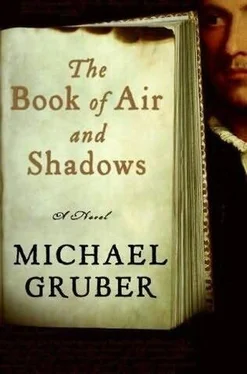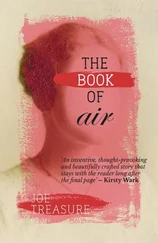Crosetti was the last one to enter the airplane and took the remaining seat, which was leather smooth as girls and comfortable enough to qualify as a mortal sin all by itself. The uniformed woman asked him if he wanted something to drink and of course he asked for champagne and got it, a split of Krug, perfectly chilled, and a crystal flute to drink it from and a basket of little crackers and a ceramic tub of soft cheese. The man across the aisle was having a beer, but he had a little basket too. This was the brother. Crosetti examined him peripherally as the plane rolled across the taxiways. He was wearing a dark sweater and blue jeans and wore cheap sneakers on his feet. The poor relation? He was reading the morning’s New York Times , scanning it really, as if the news bored him, or he knew what it was going to say already. Crosetti appreciated the feeling; this was how he himself read the paper, except for the movie reviews. He wondered if the man were an actor, a terrific-looking guy really, and wondered too at the genetics that had cranked out this one and Mishkin from the same batch.
Suddenly the man snapped the paper shut, folded it, and jammed it into a seat pocket. He turned to Crosetti and said, “I’ve lost the ability to distinguish truth from fiction in the news, with the exception of the scores in sports. I don’t know why I bother. It just makes me angry without a reasonable outlet.”
“You could tear the paper into shreds and stamp on the scraps.”
The man smiled. “I could, but that sounds like something my brother might do.”
“He has a temper. That cell phone business?”
“Yes, and killing two people. But the strange fact is he doesn’t have a temper. He’s the mildest, longest-suffering guy in the world. I’m the one in the family with a temper.”
“Could’ve fooled me.”
“Yeah, but he’s not himself,” said the brother. “Violence sometimes does that. I saw it in the army a lot. People construct a persona, a mask, and they come to believe that it’s really them, down to the core, and then events happen that they never expected and the whole thing just cracks off, leaving their tender pulpy insides exposed to the harsh elements.”
“Like post-traumatic stress?”
The man made a dismissive gesture. “If you buy psychobabble. It suits the culture to dump a whole set of unrelated symptoms suffered by completely different kinds of people as a result of completely different kinds of events into a box with that phrase on the label. It’s about as useful and as intellectually valid as stamp collecting. My brother lived a tightly controlled existence that, while enormously successful, was cut off from the wellsprings of life by addiction. He was living a lie, as the saying goes, and such lives are in fact fairly fragile. There is no real resilience in them.”
“What’s he addicted to?”
“My, you’re a nosy fellow.” This was said not unkindly, and Crosetti grinned.
“Guilty. It’s a bad habit. I excuse it by saying it’s because I want to plumb the depth of the human condition for my work.”
“Oh, right, you’re the screenwriter. Jake mentioned something about that. Plumb your own depths then. What do you think of Tarantino?”
“Not a plumber of depths,” said Crosetti and imitated the other man’s dismissive gesture. “What’re you doing in Europe?”
“Family business.”
“Connected to all this? I mean the paper chase, the secret manuscript…?”
“Indirectly.”
“Uh-huh. You’re a lawyer too?”
“I’m not.”
“You know, if you want to keep stuff mysterious, the way to do it is not to make cryptic comments but to adopt a fictitious and boring persona. James Bond always said he was a retired civil servant and that usually closed out the conversation. Just a tip from the world of movies.”
“Okay. I’m a Jesuit priest.”
“That works for me. I think we’re departing. We didn’t even get a safety demonstration. Is that because they don’t care or because no one can conceive of any misfortune befalling the ruling classes?”
“The latter, I think,” said Paul. “It’s hard to remain rich without developing a defect in the sympathetic imagination.”
Crosetti had never experienced a quicker takeoff. The engines strained briefly, the cabin tilted back like a La-Z-Boy, and they were above the clouds in what seemed like a few seconds.
When the plane was flying level again, Crosetti said, “I assume you know the whole story thus far. I mean about the Bracegirdle letters and the cipher and all that.”
“Well, I’ve read the letter and Jake told me a little of what you’ve learned about the nature of the cipher.”
“What do you think?”
“About our chances of interpreting it and finding this supposed lost play? Negligible. I mean we’d need the actual grille according to you, and what are the chances of a piece of perforated paper surviving for nearly four hundred years? And how would we even recognize it? And no cipher, no play-that seems fairly clear.”
“So why are you here?”
“I’m here because since this letter emerged, my brother has asked me for help for the first time in our entire lives. Twice. I want to encourage this. Jake needs a lot of help. And I owe him. He was very good to me when I was in prison and for a period afterward, although he utterly despised me. It was an act of real charity, and I want to pay him back if I can.”
“Why were you in prison?” asked Crosetti. But the other man smiled, gave a short, low laugh, shook his head, took a thick paperback out of his flight bag, and slipped on reading glasses. Curious Crosetti glommed the title: Hans Küng’s Does God Exist? , which struck Crosetti as an odd choice for an airplane book, but what did he know about the man? He slid his laptop out of his briefcase, placed it on the solid table provided, and turned it on. To his surprise, the little icon that announced the availability of an Internet connection lit up, but of course the sort of people who flew in private jets could not bear to be cut off from the Internet while airborne. Cell phones probably worked too. He put the headphones on and slid a copy of Electric Shadows into the drive. Oh, of course, the seat had an A/C plug in too, God forbid the rich would ever have to depend on laptop batteries! He watched the movie with the usual critical discontent he felt when watching debut features by someone of his generation. And a woman, too. And a Chinese woman. Xiao Jiang was pretty good, and he tried to give her credit for it and not think bad thoughts about what she had done to get the chance. It was Cinema Paradiso against the background of the Cultural Revolution and the point seemed to be that no amount of bad art and state control could keep movies from being glamorous. The thirty-year time shifts were handled well, and the film had the typical aesthetic grace of all Chinese films, but the plot and the emotions generated by the cast seemed soap opera-ish, he thought, writing the review, a good debut from a talented director, not to be compared with Albert Crosetti, of course, who would never get a chance to write and direct a feature…
When the film ended he brought up the Final Cut scriptwriting word-processor and started a fresh script. It wanted a title. He typed in Carolyn Rolly , and thought about films named after women: Stella Dallas. Mildred Pierce. Erin Brockovich. Annie Hall. Yes, but…He deleted it and typed The Bookbinder , an original screenplay by A. P. Crosetti. A. Patrick Crosetti. Albert P. Crosetti.
Crosetti was a slow writer ordinarily, a big deleter, a pacer, a procrastinator, but now it wrote, as the silly expression went, itself. He had nearly the whole first act done, from the bookshop fire through the first night in the bookbinder’s loft, and the discovery of the manuscript, including the first flashback, a short scene from Carolyn’s childhood and its horrors. He read it over and found it good, suspiciously good, better than anything he’d done before, deep and dark and European, but with a higher tempo than the general run of serious Eurofilms. He checked his watch: nearly two hours had passed. Outside the window it was growing dark; the plane flew over a clotted field of Arctic clouds. He stretched, yawned, saved his work, and got up to visit the toilet. When he returned he found Mishkin in his seat in what seemed like urgent conversation with his brother.
Читать дальше












